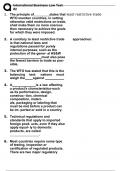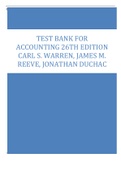Exam (elaborations)
International Business Law Test #2
- Institution
- International Business Law Test #2
1. The principle of states that least restrictive trade WTO member countries, in setting otherwise valid restrictions on trade, shall make them no more onerous than necessary to achieve the goals for which they were imposed. 2. A corollary to least restrictive trade is that national laws and reg...
[Show more]




